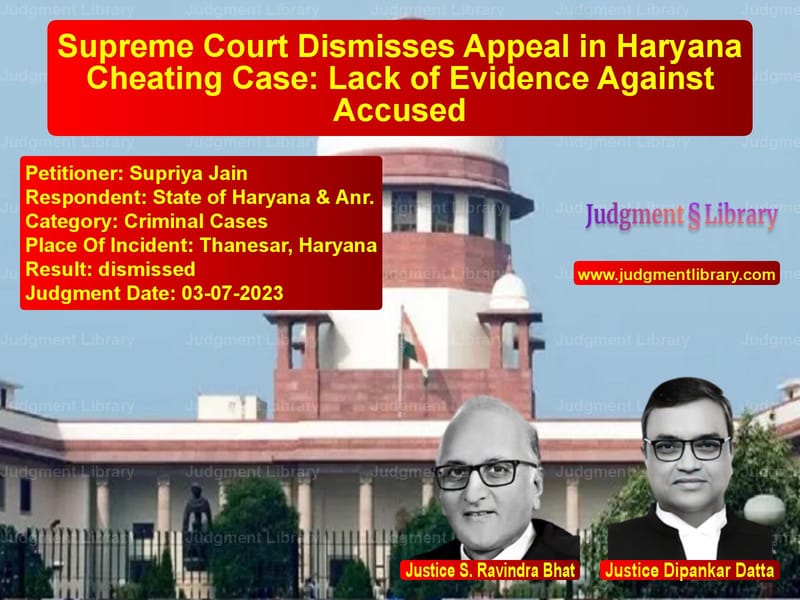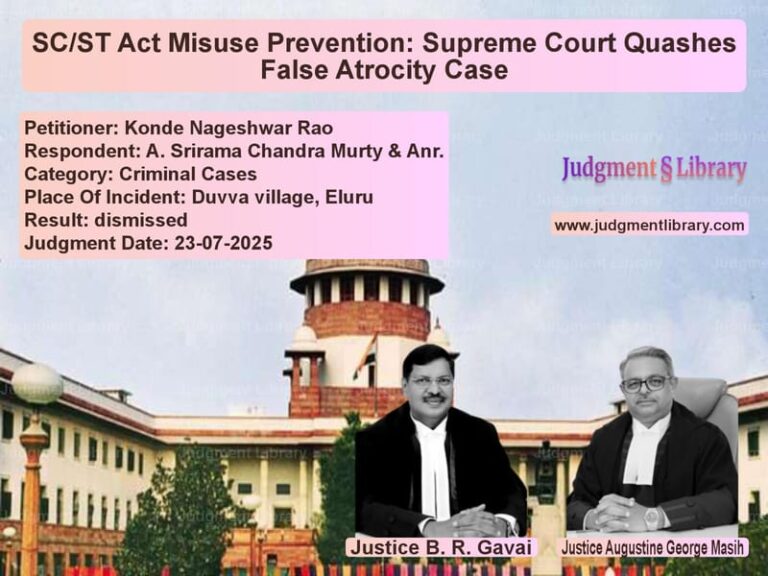Supreme Court Dismisses Appeal in Haryana Cheating Case: Lack of Evidence Against Accused
The case of Supriya Jain v. State of Haryana & Anr. revolved around an alleged financial fraud involving the establishment of a pharmaceutical company. The Supreme Court upheld the Haryana High Court’s decision to proceed with the trial, dismissing the appellant’s plea for quashing criminal charges.
Background of the Case
The case originated from FIR No. 658 dated August 2, 2020, registered at Thanesar City Police Station under various sections of the Indian Penal Code (IPC), including:
- Section 406: Criminal breach of trust
- Section 420: Cheating and dishonestly inducing delivery of property
- Section 506: Criminal intimidation
- Section 120B: Criminal conspiracy
The complainant alleged that she was deceived into investing Rs. 45 lakh in an Ayurvedic medicine manufacturing business based on false assurances.
Key Developments Leading to Litigation
- August 4, 2020: The FIR was amended to include Section 379 (Theft).
- February 14, 2022: A charge sheet was filed against the accused, including the appellant.
- July 18, 2022: The Chief Judicial Magistrate (CJM) framed charges.
- September 27, 2022: The Additional Sessions Judge dismissed a revision petition.
- November 11, 2022: The Haryana High Court refused to quash the proceedings.
- July 4, 2023: The Supreme Court upheld the High Court’s ruling.
Arguments Before the Supreme Court
Appellant’s Arguments
The appellant, Supriya Jain, challenged the allegations, arguing:
- She was only introduced to the complainant by the principal accused (her sister) and had no direct role in the alleged fraud.
- The charge sheet failed to specify any clear act of cheating or misrepresentation by her.
- Her mere association with the accused should not be grounds for criminal prosecution.
- Her anticipatory bail and cooperation with the investigation were ignored in the charge sheet.
Respondent’s Arguments (State of Haryana)
The State contended:
- The complainant had lost a substantial amount of money due to the accused’s false assurances.
- The charge sheet, though lacking specific allegations against the appellant, indicated her participation in the conspiracy.
- Statements from witnesses, including the complainant’s sister-in-law, supported the allegations.
- The High Court had already considered these points and found sufficient material to proceed with the trial.
Supreme Court’s Analysis and Judgment
A bench comprising Justices S. Ravindra Bhat and Dipankar Datta ruled that the charges against the appellant should not be quashed at the pre-trial stage.
Key Observations of the Court
1. Role of the Appellant Was Not Clearly Established
“The charge sheet does not specify with clarity the role of the petitioner in either cheating or defrauding the second respondent but refers to her, at best, as a conspirator.”
The Court acknowledged the weak allegations but stated that a full trial was necessary to determine guilt.
2. No Direct Evidence of Cheating
“Apart from being introduced by the principal accused, the FIR contains no other allegation against the petitioner.”
The Court noted that the allegations focused on the principal accused and her husband rather than the appellant.
3. Insufficient Evidence for Section 379 IPC
“The charge-sheet does not reveal any role of the petitioner in respect of the offence under Section 379 of the IPC.”
The Court found that the theft charge had no factual basis against the appellant.
4. Confessional Statement Was Not Legally Valid
“The petitioner had made a confessional statement which, ultimately, she declined to sign; hence, she was also charged under Section 180 of the IPC.”
The Court ruled that unsigned statements could not be used as evidence against the accused.
Final Verdict
The Supreme Court dismissed the appeal, stating:
“The trial ought to be permitted to proceed and the petitioner obliged to stand trial.”
The Court allowed the prosecution to continue but warned against misusing procedural loopholes to delay justice.
Impact of the Judgment
This ruling has several legal implications:
- Pre-trial quashing requires strong grounds: Mere association with the accused is insufficient to quash proceedings.
- Unsigned statements lack evidentiary value: Confessions not signed by the accused cannot be used as incriminating evidence.
- Weak allegations can still lead to trial: Even when specific charges are unclear, courts may allow prosecution if some evidence exists.
- Procedural lapses do not automatically nullify cases: The prosecution must be given an opportunity to present its case.
Conclusion
The Supreme Court’s decision in Supriya Jain v. State of Haryana emphasizes that criminal cases must go through trial unless there is a clear abuse of process. The ruling reinforces the legal standard that pre-trial quashing of charges should be rare and only in cases of glaring legal deficiencies.
Petitioner Name: Supriya Jain.Respondent Name: State of Haryana & Anr..Judgment By: Justice S. Ravindra Bhat, Justice Dipankar Datta.Place Of Incident: Thanesar, Haryana.Judgment Date: 03-07-2023.
Don’t miss out on the full details! Download the complete judgment in PDF format below and gain valuable insights instantly!
Download Judgment: supriya-jain-vs-state-of-haryana-&-a-supreme-court-of-india-judgment-dated-03-07-2023.pdf
Directly Download Judgment: Directly download this Judgment
See all petitions in Fraud and Forgery
See all petitions in Bail and Anticipatory Bail
See all petitions in Extortion and Blackmail
See all petitions in Judgment by S Ravindra Bhat
See all petitions in Judgment by Dipankar Datta
See all petitions in dismissed
See all petitions in supreme court of India judgments July 2023
See all petitions in 2023 judgments
See all posts in Criminal Cases Category
See all allowed petitions in Criminal Cases Category
See all Dismissed petitions in Criminal Cases Category
See all partially allowed petitions in Criminal Cases Category







